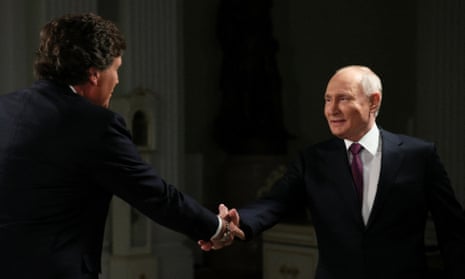The former Fox News host Tucker Carlson’s much touted sit-down with Vladimir Putin was many things.
It was damaging to global democracy, giving ammunition to the craven congressional Republicans who want to do Putin’s bidding by denying aid to Ukraine. It was boring, particularly given the Russian president’s long discourse, early in the two-hour slog, on his version of the history of the region.
And it was a priceless propaganda gift, helping Putin in every possible way with his messaging – internally in Russia, and externally to the world – about Ukraine. That started with Carlson’s introductory video message, recorded after the interview, urging his viewers on X (formerly Twitter) to see Putin above all as “sincere”.
But here’s what the interview was not. It was not journalism, despite being a rare chance for a western media figure to question the Russian leader.
Even Carlson’s question – toward the end of the excruciatingly long session – about the imprisoned Wall Street Journal reporter Evan Gershkovich wasn’t really a gesture of journalistic solidarity or a nod to democratic ideals about a free press.
Instead, it was decency theater, poorly performed.
Sucking up to Putin at every turn, Carlson described Gershkovich – an accomplished and respected American reporter in his 30s – as a “kid” and even suggesting that he may have done something illegal that justified his arrest almost a year ago.
Gershkovich’s colleagues at the Wall Street Journal were appropriately appalled. Ted Mann, a Journal reporter, tweeted that it was “disgraceful” of Carlson to suggest he’d broken the law, and the Journal issued a statement that made their position clear: “Evan is a journalist and journalism is not a crime. Any portrayal to the contrary is total fiction.”
A personal note: Gershkovich was my editorial assistant in 2015 when I was the New York Times public editor; even then, when he really was a kid in his early 20s, he was diligent, honest and a journalist at heart; I’m sickened by how he’s been treated.
I’m sure that Carlson would love to help bring Gershkovich home, as he suggested – think of the publicity – but Putin didn’t bite. He insisted that the Journal reporter was “caught red-handed when he was secretly getting confidential information”. That sounds a lot like reporting; and there’s no reason to think Gershkovich was a pipeline to the government.
But Putin clearly wants a swap for Vadim Krasikov, an FSB assassin serving a life sentence in Germany for killing a Georgian military officer in Berlin in 2019. After all, state-approved assassins must be looked after; that’s crucial messaging, too, if you want that work to continue.
Nor did Carlson say a word about Alsu Kurmasheva, an editor with Radio Free Europe/Radio Liberty who has been in Russian custody since October. Russia claims she failed to register as a foreign agent. And, of course, Carlson made no mention of the nearly two dozen journalists who have been killed in Russia since Putin came to power, with little or no legal accountability for the perpetrators.
No, even Carlson’s nod to journalism proved that he doesn’t really care about anything but his own faded relevancy and getting his career back on track.
Did the sit-down with Putin serve that purpose? It certainly gave Carlson renewed visibility and ego gratification, so let’s call that a win for the smarmiest guy in American media.
But the benefit to Carlson pales in comparison to what Putin got. As NPR’s David Folkenflik noted: “Russian media has fawned over Carlson this week, giving his comings and goings in Moscow a treatment akin to US media’s coverage of Taylor Swift.” The interview has circulated widely in Russia – and why not?
So Carlson’s interests were served, as were Putin’s.
As for the truth, not so much. But really, no surprise there. Cast your mind back to last April when Fox abruptly dumped their rainmaker and ratings star.
The reasons were never completely clear. But they surely had something to do with the huge settlement – $787m – that Fox had just paid to Dominion Voting Systems after the network circulated lies about the 2020 election and that company’s supposed role.
Carlson has never been a stickler for the truth, as he proved in the run-up to this interview, when he claimed that he was the only western media figure who cared enough to get Putin on the record.
That’s absurd. Many American reporters have tried unsuccessfully to sit down with Putin, especially since the invasion of Ukraine.
But the Russian president was waiting for the right stooge. With Carlson, he got just that.
Margaret Sullivan is a Guardian US columnist writing on media, politics and culture

